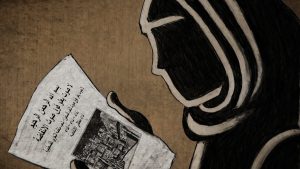The Interminable Palestinian Uprising

“Naila and the Uprising” is a new film about Palestine—an old story with a new edition. An almost exclusively women’s production “Naila” effectively employs evocative animation alongside compelling personal testimonials of Palestinian resistance 30 years ago.
The “Great March of Return” which the world just experienced– immobilized and shamed by the silence of political leaders– will doubtless be the focus of some future documentary. Naila’s story, which begins with her resistance efforts and imprisonment in the early 1980s, is nevertheless timely. See this.
Why? Because every record of Palestinian civil resistance is linked to today’s, to the next, and to the last– reaching back to the 1967 war. It was then that Israel imposed more severe restrictions on Palestinian life, when Israeli authorities explicitly announced their determination to suppress Palestinian aspirations of any kind, by any means, and to continue to expropriate their homes and lands.
Daily, in one form or another– by one death each day or 60, by one smashed home, one detention or one prison sentence, one deported dissident, one miscarried baby, one interrogation, or one handicapped body, one uprooted olive tree, one ravaged field, one expropriated farm, or one more check point, one dispossessed family, by another law restricting residence in Jerusalem, or another barrier set along an ancient road—Israel hammers at Palestinian existence. Then, every day, or each month, or after a year, Palestinian resistance re-emerges.
“Naila and the Uprising” returns to the 1980s to reveal the early stages of what has become an inexorable reassertion by Palestinians of their history and their legal and moral claims. The primary voice within this film, Naila Ayesh, speaks to Majd, her now grown son, taking him and viewers to before his birth, to 1950.
Majd’s mother was 8 years old, at school, when she heard that her home had been demolished by Israeli bulldozers. Now 60, Naila recalls her departure for Bulgaria to study 10 years later. There she met Jamal Zakout, the man she would marry, and with whom she would return to Gaza and engage together in their lifelong resistance to occupation.
Her story reminds us of now forgotten Zionist tactics, in this case, the exiling of dissidents. Zakout was one of many Palestinians expelled from Gaza. Moreover, we witness (with live footage from the event) how, when Naila and her son sought to visit Zakout (in Egypt), Israeli authorities allowed them to do so only if they remained away for two years. The history of heartless strategies employed by Israel is a long one.
The widespread deportation and imprisonment of Palestinian men at that time resulted in drawing Palestinian women more actively into the struggle, a point around which this film turns. See this. “Naila and the Uprising” includes testimonials by colleagues of Naila, young women, their babies on their backs who began to march in protest. Their actions in turn led to the formation of women’s committees which helped launch a successful boycott of Israeli goods. (Today that kind of boycott is less possible since Israel’s grip on Palestinian economy is far more impenetrable.)
That 1988 boycott and the pervasive engagement of women in the resistance, the film argues, was a major factor in creating a sustained uprising– what became known as the Intifada.
One could interpret last month’s Great March of Return —resulting in 123 murdered and over 13,000 wounded—as the latest expression of the Intifada. There are bound to be more.
Completed in 2017, “Naila and The Uprising” is showing in theaters in Europe, Canada and USA. See trailer below.
*
Dr Aziz is the author of Heir to A Silent Song: Two Rebel Women of Nepal, published by Tribhuvan University in Nepal in 2001, and available through Barnes and Nobel. She is a frequent contributor to Global Research.


